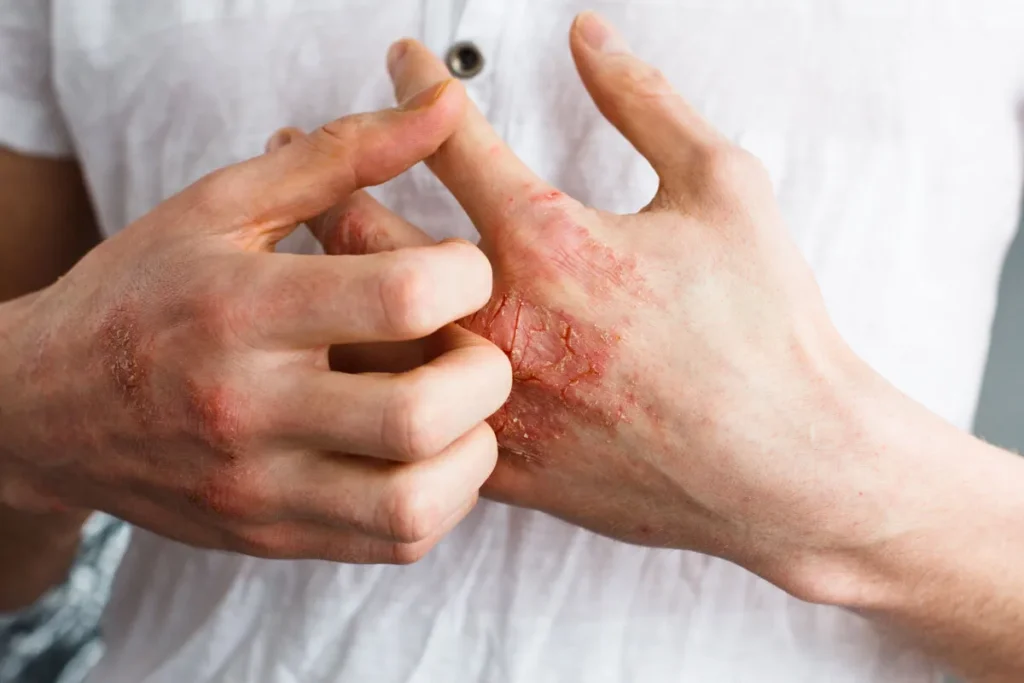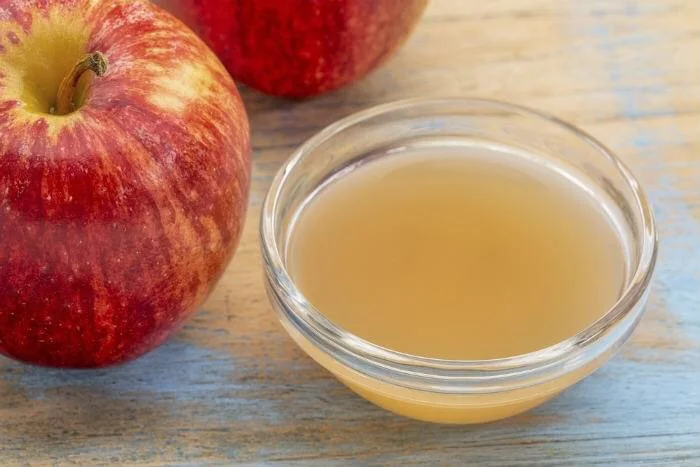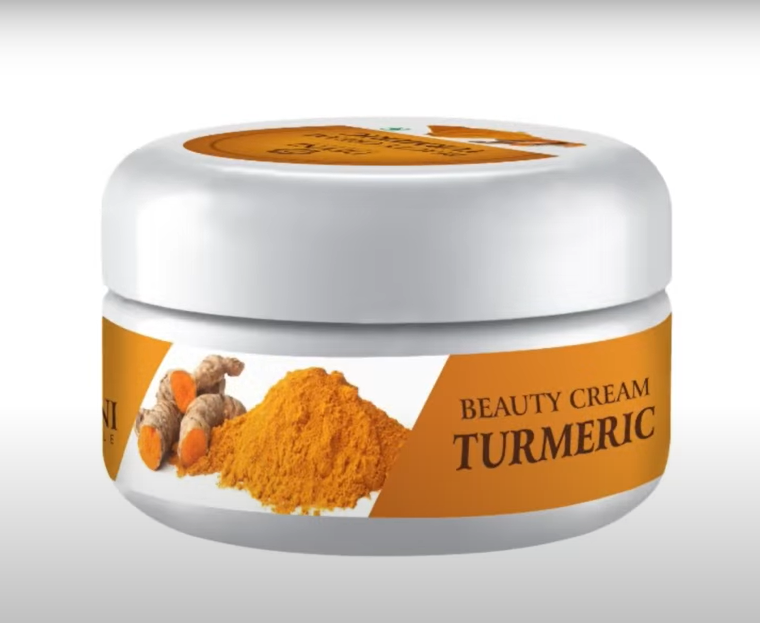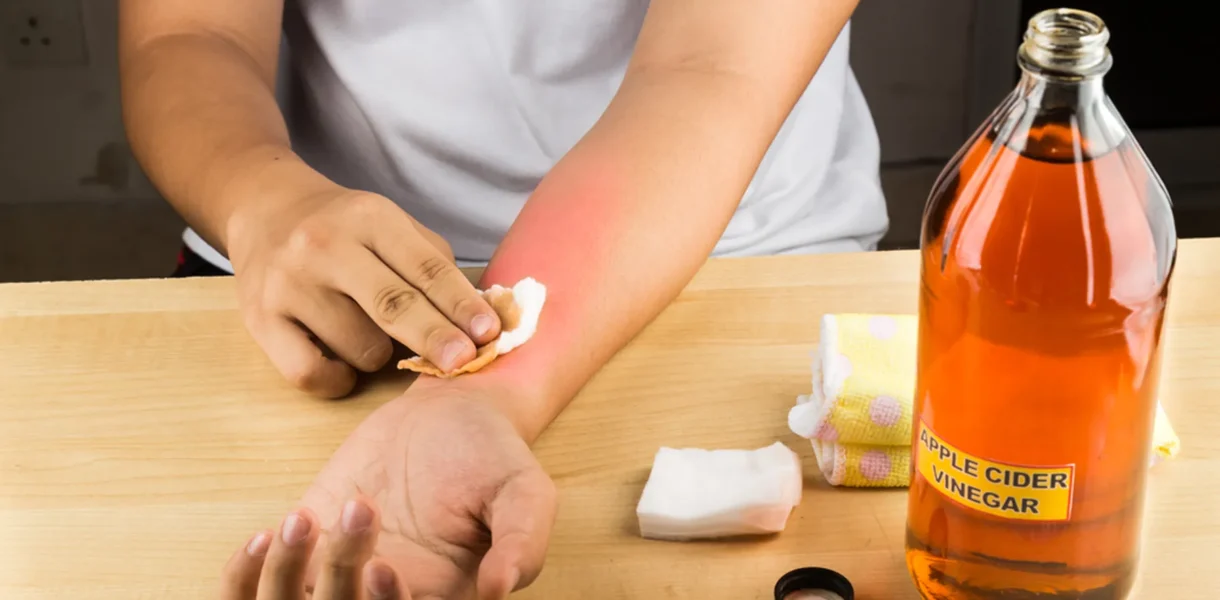Table of Contents
If you’re searching for natural ways to manage eczema, you might be surprised to learn that a common household ingredient could offer relief apple cider vinegar. Increasingly, people are turning to apple cider vinegar for eczema due to its potential to soothe inflammation, balance skin pH, and promote healing. This article will guide you on how to use apple cider vinegar effectively for eczema, along with other natural remedies and supplements that can support your journey toward healthier skin.
Apple Cider Vinegar for Eczema
so apple cider vinegar apparently has some really um great effects for many things including skin disorders like eczema
What is Eczema?

Eczema is an inflammatory skin disorder which actually originates from the gut if there’s a permeability issue let’s say there’s leaky gut then there’s certain things that can get in through those holes and create an immune reaction and you end up with a skin disorder
- Eczema is an inflammatory skin disorder
- Originates from gut issues
- Leaky gut can lead to eczema
Eczema Symptoms
the symptoms include like itchiness redness papules which also can be a bit scaly
- Itchiness
- Redness
- Papules (can be scaly)
How to Use Apple Cider Vinegar for Eczema

but you would want to use this topically take some apple cider vinegar like one tablespoon and about eight ounces of water and then apply it to your skin
now what’s interesting about this is that your skin naturally is acidic and so is apple cider vinegar but of course we’re not putting you know the concentrated version we’re going to dilute it but the acetic acid seems to help the skin which is already acid versus people using lotions and detergents and soaps which is alkaline which sometimes that can worsen this skin condition or any skin condition
- Mix 1 tablespoon of apple cider vinegar with 8 ounces of water
- Apply diluted solution to skin
- Skin is naturally acidic, and so is apple cider vinegar
- Acetic acid in ACV helps the skin
- Avoid alkaline products like lotions, detergents, and soaps
Other Natural Remedies for Eczema
and you can also apply other things on your skin like coconut oil which actually will moisturize the skin and there’s some additional properties in the coconut oil it can act as an anti-inflammatory it’s good for the immune system and then you have manuka honey
which you can actually maybe put in the coconut oil which is antibacterial anti-inflammatory and there’s some additional things in there as well now aloe is also great for your skin it’s used in wound healing it’s antibacterial it’s anti-inflammatory
so again you can maybe mix that with the coconut oil and the honey then you have turmeric cream which turmeric is probably the most potent antioxidant as far as a plant goes and you can buy that in a cream and apply that to your skin

because that’s going to help you reduce inflammation and actually speed up the healing process in 2016 there was a review that showed 18 studies of positive effects using turmeric cream
now i would also take a good amount of vitamin d orally i would recommend doses in 20 000 ius with zinc as well about i’d say 50 milligrams and some cod liver oil now why the cod liver oil because it has the omega-3 it has the d and vitamin a and all of that is very beneficial to your skin
so we have a topical remedy and we also have something you can take orally
- Coconut oil: Moisturizes, anti-inflammatory, good for immune system
- Manuka honey: Antibacterial, anti-inflammatory
- Aloe: Great for skin, used in wound healing, antibacterial, anti-inflammatory
- Turmeric cream: Potent antioxidant, reduces inflammation, speeds healing
- Vitamin D: Take orally, 20,000 IU recommended
- Zinc: 50 mg recommended
- Cod liver oil: Contains omega-3, vitamins D and A
Summary
Symptoms of eczema:
• Itchy skin
• Redness
• Papules
• Scaly skin
How to use apple cider vinegar for eczema:
- Mix 1 tablespoon of apple cider vinegar in 8 ounces of water
- Apply this mixture to your skin
Other potential remedies for eczema (apply topically):
• Coconut oil
• Manuka honey
• Aloe vera
• Turmeric cream
Other potential remedies for eczema (take orally):
• Vitamin D
• Zinc
• Cod liver oil
DATA
https://www.sciencedirect.com/science/article/pii/S2225411014000078
https://www.sciencedirect.com/science/article/pii/S2225411017300871
https://www.tandfonline.com/doi/full/10.1080/09540105.2015.1104653
https://pubmed.ncbi.nlm.nih.gov/22998411
https://pubmed.ncbi.nlm.nih.gov/19480603
https://pubmed.ncbi.nlm.nih.gov/27213821
FAQ
Can I put apple cider vinegar on eczema?
Yes, apple cider vinegar (ACV) can be used topically to help manage eczema symptoms. ACV is a mild acid that may help restore the skin’s natural pH balance, which can be disrupted in people with eczema.[1][2] The acidic nature of ACV may also have antimicrobial properties that can help fight bacterial infections often associated with eczema flare-ups.[3][5]
When using ACV for eczema, it’s important to dilute it with water first, as undiluted ACV can be irritating to the skin. Start with a small patch test to ensure you don’t have an adverse reaction. If tolerated well, you can try adding ACV to a bath, using it as a toner, or applying a diluted solution directly to affected areas.[1][3]
What heals eczema the fastest?
There is no single “fastest” way to heal eczema, as it is a chronic, relapsing condition. However, a combination of the following approaches may provide the quickest relief for eczema flare-ups:
- Moisturizing: Keeping the skin well-hydrated with fragrance-free, gentle moisturizers is crucial for repairing the skin’s protective barrier and reducing inflammation.[2]
- Topical corticosteroids: Prescription-strength topical steroid creams or ointments can quickly reduce inflammation and itching during acute flare-ups.[4]
- Identifying and avoiding triggers: Identifying and avoiding personal eczema triggers, such as certain soaps, fabrics, or environmental factors, can help prevent flare-ups.[2]
- Soothing baths: Colloidal oatmeal or apple cider vinegar baths can provide immediate relief for itchy, inflamed skin.[1][3]
- Oral antihistamines: Over-the-counter antihistamines can help relieve severe itching and allow the skin to heal.[4]
The key is to work closely with your dermatologist to develop a comprehensive treatment plan tailored to your individual needs and eczema severity.
Does cider affect eczema?
There is limited evidence on the direct effects of cider consumption on eczema. However, some research suggests that certain dietary factors may influence eczema symptoms:
- Acidity: The acidity in apple cider vinegar (ACV) may help restore the skin’s natural pH balance, which can be disrupted in people with eczema.[1][2] Topical use of diluted ACV may provide relief.
- Probiotics: The fermentation process in cider production can result in probiotic content, which may have a beneficial effect on the gut microbiome and potentially influence eczema symptoms.[3]
- Allergies: For some individuals, the consumption of certain foods, including apples or apple cider, may trigger an allergic response that exacerbates eczema symptoms. Identifying and avoiding personal food triggers is important.[4]
It’s important to note that the research on the direct impact of cider consumption on eczema is limited. Individual responses may vary, and it’s best to consult with a healthcare provider before making any significant dietary changes to manage eczema.
Can apple cider vinegar help skin problems?
Yes, apple cider vinegar (ACV) may have some beneficial effects on certain skin conditions, including eczema:
- pH balancing: ACV is a mild acid that may help restore the skin’s natural acidic pH, which can be disrupted in conditions like eczema.[1][2]
- Anti-inflammatory properties: The acetic acid in ACV may have anti-inflammatory effects, which could help reduce the redness and itching associated with eczema flare-ups.[3][5]
- Antimicrobial effects: ACV has been shown to have antimicrobial properties, which may help fight bacterial or fungal skin infections that can complicate eczema.[3][5]
- Soothing relief: Some people report that using diluted ACV as a topical treatment or in baths can provide immediate relief for itchy, inflamed skin.[1][3]
However, it’s important to note that the scientific evidence on the effectiveness of ACV for skin conditions is limited. Additionally, undiluted ACV can be irritating to the skin, so it’s crucial to always dilute it before use and perform a patch test first.[1][3]
Drinking apple cider vinegar for itchy skin
There is limited evidence to support the use of oral apple cider vinegar (ACV) for treating itchy skin or eczema. While some people report anecdotal benefits, the scientific research on this topic is inconclusive.
The potential mechanisms by which oral ACV may help with itchy skin include:
- pH balancing: The acidity in ACV may help restore the skin’s natural pH balance, which can be disrupted in conditions like eczema.[1][2]
- Anti-inflammatory effects: The acetic acid in ACV may have anti-inflammatory properties that could help reduce skin inflammation and itching.[3][5]
- Gut health: ACV may have a positive impact on gut health and the gut-skin axis, which could potentially influence skin conditions like eczema.[3]
However, it’s important to note that the research on the direct effects of oral ACV consumption on eczema or itchy skin is limited. Additionally, consuming large amounts of undiluted ACV can be harmful, as it is highly acidic and may damage tooth enamel or the esophagus.[1]
If you’re considering trying oral ACV for itchy skin, it’s best to consult with your healthcare provider first and start with small, diluted doses to assess your individual tolerance and response.
Can apple cider vinegar make eczema worse?
In some cases, the use of apple cider vinegar (ACV) may worsen eczema symptoms, especially if it is not used properly:
- Skin irritation: Undiluted ACV is highly acidic and can be irritating to the already sensitive, inflamed skin of people with eczema. This can exacerbate symptoms like redness, stinging, and burning.[1][3]
- Disruption of skin barrier: The acidity in ACV may disrupt the skin’s natural protective barrier, leading to increased water loss and further dryness, which can worsen eczema.[2]
- Allergic reaction: Some individuals may have an allergic reaction or sensitivity to the compounds in ACV, causing the eczema to flare up.[3]
- Infection risk: If the skin is broken or cracked during an eczema flare-up, the use of ACV may increase the risk of bacterial or fungal infections.[3]
To minimize the risk of ACV worsening eczema, it’s crucial to:
- Always dilute ACV with water before applying it to the skin.
- Perform a patch test on a small area before wider use.
- Discontinue use if any irritation or worsening of symptoms occurs.
- Consult a healthcare provider, especially before using ACV on infants or young children with eczema.[1][3]
Proper use and monitoring are essential when incorporating ACV into an eczema management plan.
Apple cider vinegar for itchy skin rash
Apple cider vinegar (ACV) may provide some relief for itchy skin rashes, including those associated with eczema, but the evidence is limited and mixed:
- pH balancing: The acidity in ACV may help restore the skin’s natural pH balance, which can be disrupted in conditions like eczema, potentially reducing itchiness.[1][2]
- Anti-inflammatory effects: The acetic acid in ACV has been shown to have anti-inflammatory properties, which could help soothe itchy, inflamed skin.[3][5]
- Antimicrobial properties: ACV may have some antimicrobial effects that could help prevent or treat skin infections that can exacerbate itchy rashes.[3][5]
However, it’s important to note that the research on the direct use of ACV for itchy skin rashes is limited. Additionally, undiluted ACV can be irritating to the skin, especially for those with sensitive conditions like eczema.[1][3]
If you’re considering using ACV for an itchy skin rash, it’s best to:
- Dilute the ACV with water before applying it to the affected area.
- Perform a patch test first to ensure you don’t have an adverse reaction.
- Monitor for any worsening of symptoms and discontinue use if the rash becomes more irritated.
- Consult with a healthcare provider, especially for persistent or severe rashes.
Proper use and caution are essential when incorporating ACV into a treatment plan for itchy skin rashes.
Apple cider vinegar for eczema on face
Using apple cider vinegar (ACV) for eczema on the face can be tricky, as the facial skin is particularly delicate and sensitive. While some people report success with using ACV to manage facial eczema, it’s important to proceed with caution:
- pH balancing: The acidity in ACV may help restore the skin’s natural pH balance, which can be disrupted in eczema, potentially reducing inflammation.[1][2]
- Anti-inflammatory effects: The acetic acid in ACV has been shown to have anti-inflammatory properties, which could help soothe itchy, irritated facial skin.[3][5]
However, the facial skin is more sensitive than other areas of the body, and undiluted ACV can be quite irritating. This can lead to:
- Increased redness, stinging, or burning
- Disruption of the skin’s protective barrier
- Risk of infection in cracked or broken skin
To use ACV safely for facial eczema, it’s crucial to:
- Always dilute the ACV with water, using a ratio of 1 part ACV to 4-5 parts water.
- Apply the diluted solution gently to the affected areas using a cotton pad or ball.
- Rinse the area thoroughly with clean water after a few minutes.
- Follow up with a gentle, fragrance-free moisturizer.
- Perform a patch test first to ensure you don’t have an adverse reaction.
- Discontinue use if the eczema worsens or becomes more irritated.
- Consult a dermatologist, as they may recommend other, more suitable treatments for facial eczema.
Proper dilution and monitoring are essential when using ACV on the delicate facial skin.
White vinegar for eczema
While apple cider vinegar (ACV) has been more commonly explored for its potential benefits in managing eczema, white vinegar may also have some applications:
- pH balancing: Like ACV, white vinegar is acidic and may help restore the skin’s natural pH balance, which can be disrupted in eczema.[1][2]
- Antimicrobial properties: White vinegar has been shown to have antimicrobial effects, which could help prevent or treat skin infections that can complicate eczema.[3]
- Anti-inflammatory effects: Some research suggests that the acetic acid in white vinegar may have anti-inflammatory properties, which could help soothe eczema-related inflammation.[3]
However, it’s important to note that the research on the use of white vinegar specifically for eczema is limited. Additionally, like ACV, undiluted white vinegar can be quite irritating to the already sensitive skin of those with eczema.
If considering using white vinegar for eczema, it’s crucial to:
- Dilute the vinegar with water, using a ratio of 1 part vinegar to 4-5 parts water.
- Perform a patch test on a small area before wider use.
- Monitor for any signs of irritation or worsening of eczema symptoms.
- Consult a healthcare provider, especially before using on infants or young children.
While white vinegar may have some potential benefits for eczema, the evidence is not as robust as for ACV. Proper dilution and caution are essential when incorporating white vinegar into an eczema management plan.
Apple cider vinegar for itching private parts
The use of apple cider vinegar (ACV) for itching in the private/genital area is a topic that requires caution and careful consideration:
- Potential antimicrobial effects: ACV has been shown to have some antimicrobial properties, which could potentially help address fungal or bacterial infections that may be causing genital itching.[3][5]
- pH balancing: The acidity in ACV may help restore the natural pH balance of the skin in the genital area, which can be disrupted in certain conditions.[1][2]
However, the genital area is extremely sensitive, and the use of undiluted ACV can be highly irritating and cause further discomfort:
- The acidic nature of ACV can cause stinging, burning, and increased irritation if applied directly to the delicate genital skin.
- Improper use of ACV in the genital area may disrupt the natural pH and microbiome, leading to an increased risk of infections.
- ACV should never be used internally, as it can cause damage to the mucous membranes.
If you’re considering using ACV for genital itching, it’s crucial to:
- Consult a healthcare provider, such as a dermatologist or gynecologist, before attempting any home remedies.
- If approved by your provider, dilute the ACV with water (1 part ACV to 4-5 parts water) before applying it to the affected area.
- Perform a patch test first to ensure you don’t have an adverse reaction.
- Discontinue use immediately if you experience any increased irritation, burning, or discomfort.
The genital area requires specialized care, and it’s best to work closely with a medical professional to address any persistent or severe itching in this sensitive region.
Apple cider vinegar for skin problems
Apple cider vinegar (ACV) has been touted as a natural remedy for a variety of skin problems, but the evidence on its effectiveness is mixed:
- Eczema: ACV may help restore the skin’s natural pH balance and have anti-inflammatory effects, which could potentially provide relief for eczema symptoms. However, the research is limited, and undiluted ACV can be irritating.[1][2][3]
- Acne: The antimicrobial properties of ACV may help fight acne-causing bacteria, and its acidic nature may help unclog pores. But again, the evidence is limited, and ACV can be drying and irritating if not used properly.[3]
- Warts: Some studies suggest that the acetic acid in ACV may help remove warts, but the results are inconclusive, and the treatment can be painful.[3]
- Fungal infections: ACV’s antimicrobial effects may help address fungal skin infections, such as athlete’s foot or ringworm, but more research is needed.[3][5]
When using ACV for skin problems, it’s crucial to:
- Always dilute the ACV with water before applying it to the skin.
- Perform a patch test first to ensure you don’t have an adverse reaction.
- Discontinue use if you experience increased irritation, dryness, or worsening of symptoms.
- Consult a dermatologist, especially for persistent or severe skin conditions.
While ACV may have some potential benefits for certain skin problems, the evidence is limited, and it’s essential to use it with caution and under the guidance of a healthcare professional.
Apple Cider Vinegar for Eczema on the Scalp
Apple cider vinegar (ACV) may have some potential benefits for managing eczema on the scalp, but it’s important to use it with caution:
pH Balancing
The acidity in ACV may help restore the natural pH balance of the scalp, which can be disrupted in eczema. This can potentially reduce inflammation.
Antimicrobial Properties
ACV has been shown to have antimicrobial effects, which could help address any bacterial or fungal infections that may be contributing to scalp eczema.
Soothing Relief
Some people report that using diluted ACV as a rinse or hair treatment can provide immediate relief for itchy, inflamed scalp eczema.
However, the scalp skin is delicate, and undiluted ACV can be highly irritating, potentially exacerbating eczema symptoms:
- The acidity in ACV may disrupt the scalp’s natural protective barrier, leading to increased dryness and irritation.
- Applying ACV directly to open, cracked, or broken skin on the scalp can increase the risk of infection.
- People with sensitive skin or severe scalp eczema may experience stinging, burning, or worsening of symptoms when using ACV.
To use ACV safely for scalp eczema:
- Dilute the ACV with water, using a ratio of 1 part ACV to 4-5 parts water.
- Apply the diluted solution gently to the affected areas using a cotton pad or ball.
- Rinse the area thoroughly with clean water after a few minutes.
- Follow up with a gentle, fragrance-free moisturizer.
- Perform a patch test first to ensure you don’t have an adverse reaction.
- Discontinue use if the eczema worsens or becomes more irritated.
- Consult a dermatologist, as they may recommend other, more suitable treatments for scalp eczema.




